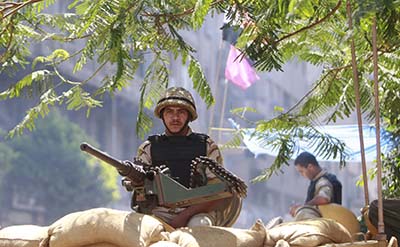New York, September 13, 2013–Egyptian authorities should halt their campaign of harassment on local and international journalists seeking to cover the ongoing political crisis in the country, the Committee to Protect Journalists said today. The latest series of anti-press violations comes as the Egyptian government announced a two-month extension to the nationwide state of emergency.
“Through a series of arrests, prosecutions, assaults and censorship, the Egyptian government has made one thing crystal clear to journalists: Deviate from the official narrative at your own risk,” said CPJ Deputy Director Robert Mahoney. “The authorities must stop this attempt at quashing independent and critical reporting. They can start by freeing all journalists in prison or under arrest.”
The government announced on Thursday that it would extend the nationwide state of emergency for two months citing security concerns, news reports said. The state of emergency grants greater powers to authorities to arrest citizens and censor the press. A separate decision is expected to be made soon about whether to extend the nightly curfew imposed in much of the country.
Within this environment of heightened tension, security forces detained Al-Ahram Gate correspondent Emad Sayed Abu Zeid in the southern governorate of Beni Suef on Thursday, news sources reported. The public prosecutor ordered Abu Zeid to be held for 15 days pending an investigation into accusations that he published news on the website Suef Online, as well as Muslim Brotherhood-affiliated social media, that harmed public opinion, Al-Ahram Gate reported. The detention came amid a police crackdown on suspected Muslim Brotherhood members and supporters in the area.
Suef Online said today that Abu Zeid had been arrested in connection with an article he wrote on September 10 that criticized the local government in Beni Suef. The journalist has written several other articles for Suef Online that criticized the military-backed government.
In an unrelated case, a military prosecutor announced on Wednesday that Ahmed Abu Deraa, a reporter for Al-Masry al-Youm, would be brought before a military court on Sunday, the paper reported. Abu Deraa, a well-respected journalist in the Sinai, has been held in military custody since being detained on September 4. He is accused of publishing false news about military operations against militants in North Sinai, photographing the Suez Canal and other military sites, and entering military zones without proper permission.
Security forces also raided the Cairo bureau of Turkish state broadcaster TRT on Tuesday, the station reported. Police confiscated cameras and computers and questioned TRT correspondent Semir Yorulmaz. The raid on the broadcaster is the latest in a string of attacks, raids, and arrests of Turkish journalists, who have been accused of biased coverage in favor of former President Mohamed Morsi. A TRT correspondent, Metin Turan, was arrested on August 17 and remains imprisoned.
At least 40 local and international journalists have been detained or arrested by Egyptian security forces since the ouster of former president Morsi on July 3, according to CPJ research. At least six remain imprisoned today.
An Egyptian journalist, Shahira Amin, told CPJ that her talk show, “In the Hot Seat,” on Nile TV International, was suspended on Sunday pending an investigation by the Egyptian Radio and Television Union. The union, which is commonly referred to as Maspero, is run by the state and reports to the information minister.
Amin said that Maspero had launched the investigation after employees from the union circulated a petition calling for her dismissal from the station and claiming she was an “enemy of the state.” The petition followed a July 7 interview Amin gave on CNN about the ongoing political crisis and media crackdown in Egypt.
Many Egyptians have sharply criticized CNN’s coverage of Egypt in recent months, claiming it is biased for calling Morsi’s ouster a “coup.” CNN staff and international journalists accused of working for CNN have been harassed and attacked while covering protests and clashes.
Al-Jazeera has also faced significant criticism for its coverage. Since Morsi’s ouster in July, the government launched a campaign of harassment against the station and its affiliates, including arrests, raids, and seizure of equipment. The network said in a statement today that it will take legal action against the Egyptian government, according to news reports. Al-Jazeera said it has asked a law firm to take action in international courts and before the United Nations.
At least eight journalists have been killed for their work in Egypt since the ouster of former president Hosni Mubarak in 2011. The Committee to Protect Journalists launched a petition on September 4 with the support of many prominent Egyptian journalists calling on the current military-backed government to undertake serious and impartial investigations into the killings of all journalists in Egypt, no matter who was in power at the time.
- For more data and analysis, visit CPJ’s Egypt page.
